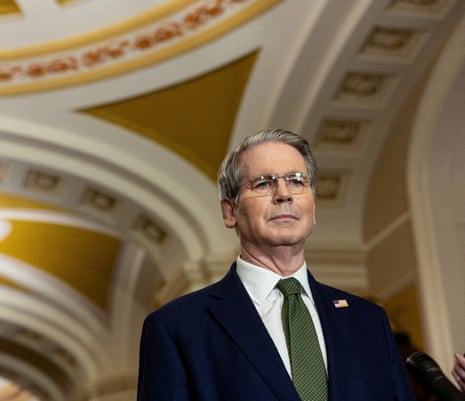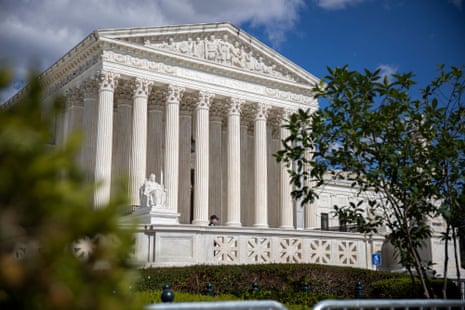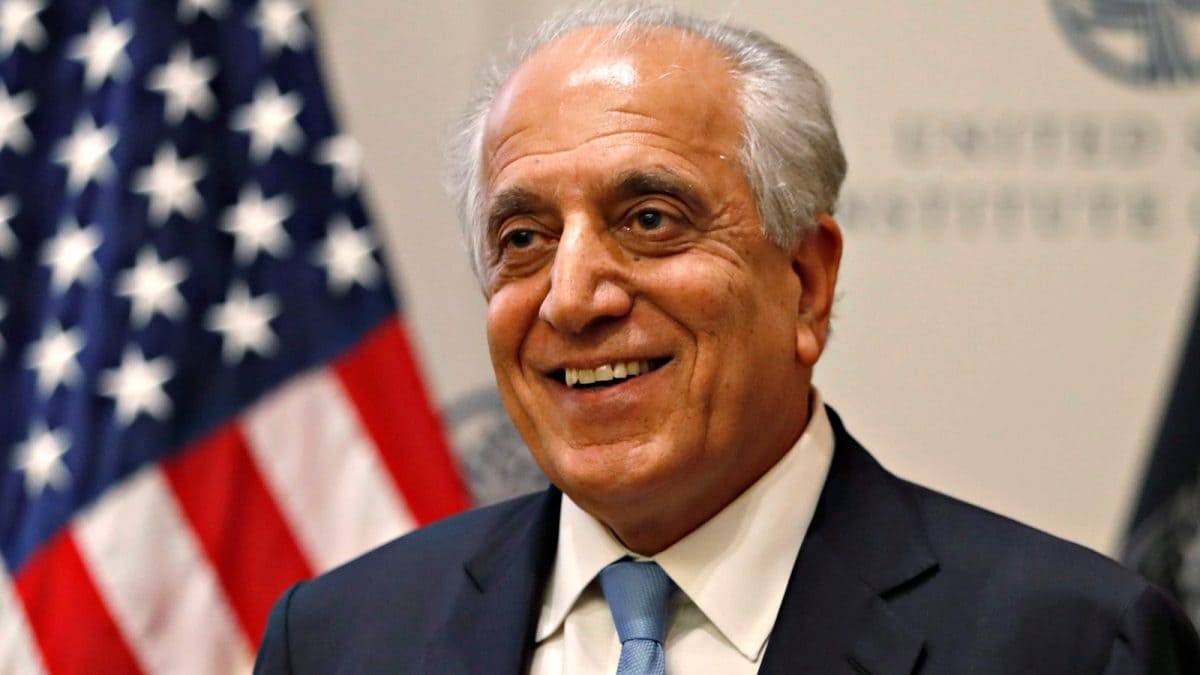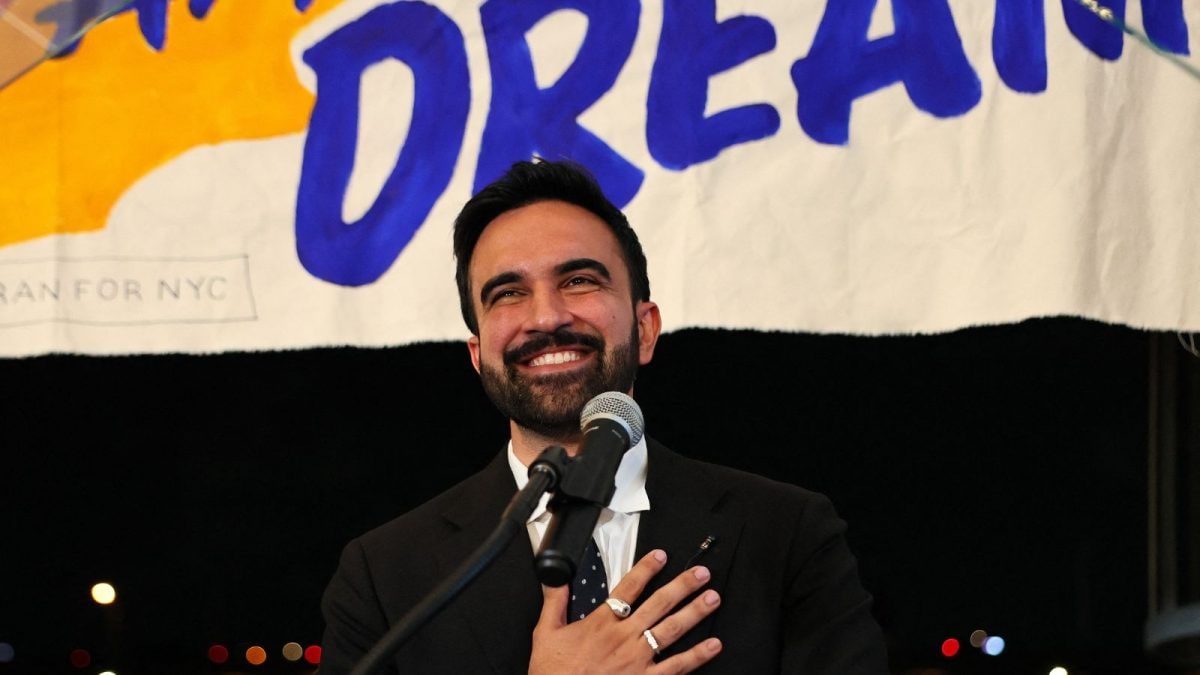Supreme court limits judges' power on nationwide injunctions in apparent win for Trump
The supreme court appears to have delivered Donald Trump a major victory by ruling that individual district court judges lack the power to issue nationwide injunctions, which Trump has complained have blocked federal government policies nationwide including his executive order purporting to end the right to automatic birthright citizenship.
The justices, in a 6-3 ruling, granted a request by the Trump administration to narrow the scope of three nationwide injunctions issued by federal judges in Maryland, Massachusetts and Washington state that halted enforcement of his birthright citizenship directive while litigation challenging the policy plays out.
It leaves unclear the fate of Trump’s attempt to restrict birthright citizenship, with the conservative majority leaving open the possibility that the birthright citizenship changes could remain blocked nationwide. The court ordered lower courts to reconsider the scope of their injunctions and specified that Trump’s order cannot take effect until 30 days after today’s ruling.
Furthermore, this decision would mean that going forward, judges will only be able to grant relief to the parties who bring a particular lawsuit and may not extend those decisions to protect other individuals without going through the process of converting a suit into a class action.
Justice Amy Coney Barrett wrote:
When a court concludes that the Executive Branch has acted unlawfully, the answer is not for the court to exceed its power, too. The Court today puts an end to the ‘increasingly common’ practice of federal courts issuing universal injunctions.”
While the court didn’t rule on the legality of Trump’s order purporting to end birthright citizenship, the three liberal justices said the president’s directive was clearly unlawful. I’ll bring you more on that soon.
Key events Show key events only Please turn on JavaScript to use this feature
Supreme court preserves key element of Obamacare preventive care
The supreme court has preserved a key element of the Obamacare law that helps guarantee that health insurers cover preventive care such as cancer screenings at no cost to patients.
The justices in a 6-3 decision reversed a lower court’s ruling that the US Preventive Services Task Force, which under the 2010 law formally called the Affordable Care Act has a major role in choosing what services will be covered, is composed of members who were not validly appointed.
Here is the full text of the opinion.
Supreme court limits judges' power on nationwide injunctions in apparent win for Trump
The supreme court appears to have delivered Donald Trump a major victory by ruling that individual district court judges lack the power to issue nationwide injunctions, which Trump has complained have blocked federal government policies nationwide including his executive order purporting to end the right to automatic birthright citizenship.
The justices, in a 6-3 ruling, granted a request by the Trump administration to narrow the scope of three nationwide injunctions issued by federal judges in Maryland, Massachusetts and Washington state that halted enforcement of his birthright citizenship directive while litigation challenging the policy plays out.
It leaves unclear the fate of Trump’s attempt to restrict birthright citizenship, with the conservative majority leaving open the possibility that the birthright citizenship changes could remain blocked nationwide. The court ordered lower courts to reconsider the scope of their injunctions and specified that Trump’s order cannot take effect until 30 days after today’s ruling.
Furthermore, this decision would mean that going forward, judges will only be able to grant relief to the parties who bring a particular lawsuit and may not extend those decisions to protect other individuals without going through the process of converting a suit into a class action.
Justice Amy Coney Barrett wrote:
When a court concludes that the Executive Branch has acted unlawfully, the answer is not for the court to exceed its power, too. The Court today puts an end to the ‘increasingly common’ practice of federal courts issuing universal injunctions.”
While the court didn’t rule on the legality of Trump’s order purporting to end birthright citizenship, the three liberal justices said the president’s directive was clearly unlawful. I’ll bring you more on that soon.
The three liberal justices Sonia Sotomayor, Elena Kagan and Ketanji Brown Jackson dissented.
Supreme court limits federal judges' power to issue nationwide injunctions
Well, it looks like the supreme court has decided 6-3 to limit the power of federal judges to grant nationwide injunctions.
The ruling, written by Justice Amy Coney Barrett, argues that these “likely exceed the equitable authority that Congress has granted to federal courts”. I’ll bring you more on this as we get it.
Further to that, Politico has a very helpful explainer on the uncertainty around whether we’ll get the blockbuster opinion everyone’s waiting for – of course Trump’s effort to end automatic birthright citizenship – today.
There’s already uncertainty about what the justices will actually decide in a case tied to Donald Trump’s effort to end automatic birthright citizenship — but we also don’t know for sure whether the court will even issue a formal opinion or opinions on the matter.
That’s because the case did not come up through the court’s usual process for cases argued before the justices: the merits docket. The case, Trump v. CASA, is actually a trio of emergency applications the Trump administration submitted to the justices in March seeking to sharply cut back nationwide injunctions judges issued against Trump’s executive order purporting to end the right to birthright citizenship in the US.
In a twist, the justice department did not ask the court for a quick decision on the legality of Trump’s anti-birthright order. (Several lower courts have ruled it blatantly unconstitutional because it conflicts with the text of the 14th Amendment’s citizenship clause.) Instead, the administration is attempting to use the dispute as a way to get the supreme Ccurt to declare that judges can’t issue broad orders that protect people with no connection to a pending lawsuit. In an unusual move, the justices agreed to hear arguments on the emergency applications and did so last month.
The oral arguments revealed no obvious consensus on the court about how to proceed or whether the case is a good vehicle to address broader concerns about the scope of nationwide injunctions. There were even some indications that the justices might want to dig into the birthright citizenship issue, which was not the focus of the legal briefs.
Because the case is up as an emergency matter, the court could forgo an opinion and simply deny the applications - at any time - in a terse order with little or no explanation of its reasoning. It could also decide it wants to get full briefing and argument on the substance of the birthright citizenship issue this fall and punt on the injunctions issue until then, leaving Trump’s birthright policy on hold.
Supreme court begins releasing decisions on last day of term
It’s almost 10am ET and the supreme court is about to open the final official opinion day of this term. We’re expecting a handful of big decisions from the high court, including whether schools can require students to participate in lessons that include LGBTQ+ content, whether a 2023 Texas law can require pornography websites to verify the ages of their users, the future of Louisiana’s second majority-Black congressional district, and others. And we might also get a decision on Trump’s attempt to sidestep the constitution to limit birthright citizenship, but we also might not. Stay tuned.
Trump administration plans second deportation of Kilmar Ábrego García, but not to El Salvador
The Trump administration is planning to deport Kilmar Ábrego García for a second time, but does not plan to send him back to El Salvador, where he was wrongly deported in March, a lawyer for the administration told a judge yesterday.
It is not clear when the deportation might occur or whether it would happen before the criminal case accusing him of smuggling migrants into the United States is complete.
Justice department lawyer Jonathan Guynn said during a hearing in federal court in Maryland that the United States does not have “imminent plans” to remove Ábrego García from the United States.
If deported, Ábrego García would be sent to a third country and not El Salvador, Guynn said. He did not name the country.

Kilmar Ábrego García, a Salvadoran national, was deported and imprisoned in El Salvador in March despite a 2019 judicial decision barring him from being sent there because of a risk of persecution.
The Trump administration brought Ábrego García back to the US earlier this month to face federal criminal charges accusing him of transporting migrants living illegally in the US. He has pleaded not guilty.
The case of Ábrego García, 29, who had been living in Maryland with his US citizen wife and their young son, has become a flashpoint over Trump’s hardline immigration agenda.
The federal judge overseeing Ábrego García’s criminal case has ordered him released ahead of trial as early as today, but the Trump administration has said it plans to immediately take him into immigration custody.
His fate would then be unclear. Ábrego García’s lawyers have asked that Ábrego García be kept in Maryland and that the justice department, which is prosecuting the criminal case, and the Department of Homeland Security, which handles immigration proceedings, ensure he is not deported while the criminal case remains pending.
Federal judges in Maryland, where Ábrego García is suing over the March deportation, and Tennessee, where criminal charges were filed, are both yet to rule on his requests.
Robert McGuire, the top federal prosecutor in Nashville, Tennessee, told US magistrate judge Barbara Holmes at a hearing in the criminal case on Wednesday that he would coordinate with the Department of Homeland Security as best as he could but ultimately could not control their decisions about where to house Ábrego García and whether to deport him.
As we wait for the supreme court’s last official decision day of the term to get going at 10am ET, the case we’re all waiting for is the one we can’t be sure is coming, writes Politico. Per this morning’s Playbook:
Trump v. Casa started as a challenge to Donald Trump’s executive order ending birthright citizenship, but became an emergency appeal that took on a central legal question of Trump’s second term: “the Trump administration’s request to rein in the power of federal district court judges to block federal policies on a nationwide basis,” Politico’s legal reporter Josh Gerstein writes. “The court could tell judges to narrow those injunctions and future ones in other cases, or set some criteria for them, or could snub the administration by turning down the request.”
Or even this: The court could instead decide to punt the restraining order matter, and deal with the birthright citizenship question first. “That could push the whole fight off until sometime this fall, after the justices return from their summer break,” Josh writes.
The US treasury secretary, Scott Bessent, said on Friday he was confident magnets would flow from China after Washington reached a rare earth deal with Beijing, Reuters reports.
“I am confident now that we as agreed, the magnets will flow,” Bessent said in an interview with Fox Business Network, adding that the US had put in countermeasures after China slowed the delivery of critical minerals.
“So what we’re seeing here is a de-escalation under President Trump’s leadership.”

Cuomo to stay in NYC mayoral race despite Mamdani besting him in primary – report
Edward Helmore
Former New York governor Andrew Cuomo reportedly plans to run as an independent candidate in New York City’s mayoral race, days after finding himself bested in the Democratic primary by progressive insurgent candidate Zohran Mamdani.

Several news outlets reported late last night that Cuomo, 67, part of a long and powerful political dynasty in New York, would not withdraw after conceding the Democratic primary to democratic socialist newcomer Mamdani, who is now the favorite in the race and could become the city’s first Muslim mayor at the general election in November.
Cuomo is now expected to continue as an independent candidate on a “Fight and Deliver” ballot line. But Cuomo has not decided whether to actively campaign in the coming months.
The former governor, who stepped down in 2021 in the face of allegations of sexual harassment and bullying in the workplace, now joins the embattled incumbent mayor, Eric Adams, a Democrat who has relaunched his campaign as an independent.
Senate Republicans seek agreement as Trump's 'big, beautiful bill' in tatters one week out from 4 July deadline
US Senate Republicans are trying to reach a consensus over Donald Trump’s sprawling tax-cut and spending bill, including proposed healthcare cuts that have worried some of their more populist-minded members, Reuters reports.
Senate majority leader John Thune has the difficult task of keeping his 53-member majority in line, as they use a parliamentary manoeuvre to bypass unified Democratic opposition to Trump’s “One Big Beautiful Bill Act,” which would extend his 2017 tax cuts and boost spending on border security and the military.
Thune’s task was further complicated this week as the Senate parliamentarian, a nonpartisan referee, informed Republicans that more than $250bn in healthcare cuts in the Republican bill did not qualify for inclusion under long-standing budget rules.
An earlier version of the bill passed by the House last month was forecast to add about $3tn to the federal government’s $36.2tn debt.
Trump yesterday expressed “hope” that the bill would pass before 4 July.
Kevin Hassett, Trump’s top economic adviser, said the president remains “highly confident” that Congress will pass the bill by the holiday.
However, it remains tight for GOP leaders trying to get the legislation over the line in time – just three Republican “no” votes in either chamber would be enough to scuttle the bill.

Iranian woman, who has lived in US for 47 years, taken by Ice while gardening

Marina Dunbar
A 64-year-old Iranian woman, who has lived in the US for 47 years, was detained by immigration agents on Sunday morning while gardening outside her home in New Orleans.
According to a witness, plainclothes officers in unmarked vehicles handcuffed Madonna “Donna” Kashanian and transported her to a Mississippi jail before transferring her to the South Louisiana Ice processing center in Basile, reports Nola.
Kashanian arrived in the US in 1978 on a student visa and later applied for asylum, citing fears of persecution due to her father’s ties to the US-backed Shah of Iran. Her asylum request was ultimately denied, but she was granted a stay of removal on the condition she comply with immigration requirements, a condition her family says she always met.
She has no criminal record but remains in Ice custody.
The timing of Kashanian’s detention came just hours after US airstrikes in Iran. Federal officials did not comment on her specific case, though the DHS released a statement highlighting the arrests of 11 Iranians nationwide over the weekend, according to Nola.
Ice also arrested two Iranian LSU students in Baton Rouge at their off-campus apartment earlier this week. Last week, Ice announced that they arrested 84 people during a raid at a south-west Louisiana racetrack. Of the 84, Ice said “at least two” had criminal records.
Statistics from early June, previously reported on by the Guardian, demonstrated an 807% increase in arrests of people without criminal histories since before Donald Trump’s second inauguration this January. Data suggests Ice is holding about 59,000 detainees in facilities across the country.
Defense secretary Pete Hegseth has announced that the US navy is renaming USNS Harvey Milk to the USNS Oscar V. Peterson.
In a post on X, Hegseth said:
We are taking the politics out of ship naming. We’re not renaming the ship to anything political. This is not about political activists, unlike the previous administration. Instead we’re naming the ship after a US navy congressional medal of honor recipient, as it should be. People want to be proud of the ship they’re sailing in.
My colleague Maya Yang reported earlier this month that Hegseth had ordered the navy to strip the name of the prominent gay rights activist and navy veteran Harvey Milk from a ship during the middle of June. The timing of the announcement, during Pride month – a month meant to celebrate the LGBTQ+ community – was reportedly intentional.
The vessel was initially named after Milk in 2016 during the Barack Obama administration. Milk was a prominent gay rights activist who served in the US navy during the Korean war. He later went on to run for office in California where he won a seat on the San Francisco board of supervisors. As one of the US’s first openly gay politicians, Milk became a forefront figure of the gay rights movement across the country before his assassination in 1978 by a former city supervisor.
Here’s Maya’s earlier report.
US supreme court expected to issue rulings in six cases on last day of term
The US supreme court is meeting on Friday to decide the final six cases of its term, including Donald Trump’s bid to enforce his executive order denying birthright citizenship to US-born children who do not have at least one parent who is an American citizen or lawful permanent resident (see earlier post).
As posted earlier, it is also to deliver a ruling on LBGTQ+ books in schools.
The justices take the bench at 10am for their last public session until the start of their new term on 6 October.
Decisions also are expected in several other important cases including:
A bid by Louisiana officials and civil rights groups to preserve an electoral map that raised the number of Black-majority congressional districts in the state and prompted a challenge by non-Black voters. State officials and advocacy groups have appealed a lower court’s ruling that found the map laying out Louisiana’s six US House of Representatives districts – with two Black-majority districts, up from one previously – violated the US constitution’s promise of equal protection, Reuters reports.
Free speech rights are at the centre of a case over a Texas law aimed at blocking children from seeing online pornography. Texas is among more than a dozen states with age verification laws. The states argue the laws are necessary as smartphones have made access to online porn, including hardcore obscene material, almost instantaneous. The question for the court is whether the measure infringes on the constitutional rights of adults as well, AP reports.


 3 hours ago
3 hours ago

















